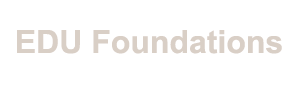
The Four Steps to Self-directed Learning
- Posted by: Edu Foundations Admin on 03-02-2022 12:30 AM
Determine your readiness to learn
For independent study to be successful, students must possess a variety of abilities and attitudes toward learning. This step requires students to assess their current environment, study habits, family status, and support network at school and at home, as well as their previous experiences with autonomous learning. Self-directed learners should be autonomous, organized, self-disciplined, capable of effective communication, and capable of accepting constructive feedback and engaging in self-evaluation and self-reflection.

Establish educational objectives
It is vital for students and their advising instructor to communicate their learning objectives. The following are the list of questions for students to consider as they plan their learning objectives. Additionally, learning contracts are crucial in establishing a shared understanding of students' and instructors' learning objectives. Contracts for education typically include the following:
- The unit's objectives
- Activity structure and sequence
- Timetable for completion of tasks
- Details about the materials used to accomplish each aim
- Specifics on the grading process
- Following the completion of each objective, feedback and evaluation are provided.
- Plan a meeting with your advising instructor.
- Unit policies, such as a policy on late assignments, must be agreed upon.
Contracts should be evaluated by the advising faculty member and concerns about feasibility highlighted (e.g., What could go wrong? Is there an inordinate amount or an inordinate amount of work? Is the timeframe and assessment reasonable?).

Participate in the educational process
Students must first understand themselves as learners before they can comprehend their self-directed learning demands. It may be good to refer pupils to our resource on learning preferences. Additionally, students should investigate the following:
- What are my instructional method requirements?
- Which teacher was my favorite? Why?
- What did they do differently than other educators? Throughout their program, students should reflect on these questions and replace the term "teacher" with "advising instructor."
Additionally, students must comprehend their method to studying:
A transformative method to studying is ideal for self-directed learning. This technique emphasizes self-understanding of concepts, application of information to novel contexts, and the use of novel examples to illustrate a concept, as well as learning more than is required for unit completion.
A surface method entails reproduction: meeting unit requirements, learning only what is necessary to pass a unit, and frequently regurgitating examples and explanations from readings. A strategic approach entails organization: obtaining the best grades possible, acquiring the knowledge necessary to pass tests, memorizing facts, and spending time practicing from previous exams.
Academic work in the past may have favored a superficial or strategic approach to studying. These strategies will not suffice (or even be appropriate) for solo study success. Independent study necessitates a more in-depth approach to learning, in which students must grasp concepts and apply information to novel situations. Students must establish their own connections and motivate themselves.
Evaluate education
Students must be able to engage in self-reflection and self-evaluation of their learning goals and progress during a unit of study in order to be successful with self-directed learning. They should do the following to aid in this self-evaluation process:
- consult with the advising faculty on a frequent basis
- solicit input
participate in self-reflection on their accomplishments, which entails the following questions:
- How do I know I've gained knowledge?
- Am I adaptable in my application of knowledge?
- Do I have confidence in my ability to explain material?
- When do I know I've acquired sufficient knowledge?
- When is it appropriate to reflect on oneself and when is it appropriate to consult with the advising faculty member?
Successful independent study necessitates that both students and advising faculty members fulfill specific tasks or functions. The following is a summary of the more critical roles. It is beneficial for both students and advising faculty members to check this list on a regular basis and speak about whether they believe the other is carrying out their portion of the obligation.

